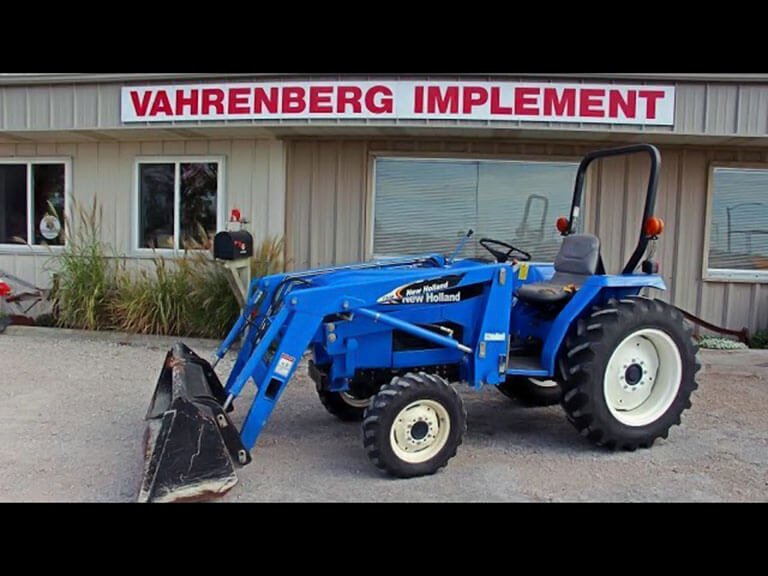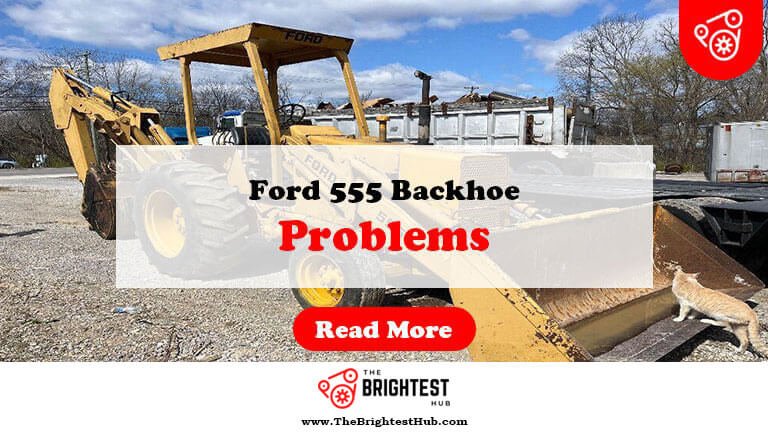New Holland TC30 Problems: Troubleshooting Tips
Common problems with the New Holland TC30 include hydraulic issues, electrical failures, and engine performance concerns. Regular maintenance can help mitigate these issues.
The New Holland TC30 is a popular compact tractor known for its versatility and efficiency. Many users appreciate its ability to handle various tasks, from landscaping to farming. However, like any machine, it can encounter problems over time. Understanding these issues can help owners troubleshoot effectively and maintain optimal performance.
Addressing problems early can prevent costly repairs and downtime. This blog will explore the most common TC30 issues, their symptoms, and potential solutions. By staying informed, you can ensure your New Holland TC30 remains a reliable workhorse for years to come.
Introduction To New Holland Tc30

The New Holland TC30 is a compact tractor designed for various agricultural tasks. It is well-known for its reliability and versatility. Farmers and landscapers often use it for mowing, tilling, and loading.
Popularity And Usage
The TC30 has gained popularity for several reasons:
- Compact Size: Easy to maneuver in tight spaces.
- Powerful Engine: Delivers adequate horsepower for small to medium tasks.
- Versatile Attachments: Compatible with many tools and implements.
This tractor is commonly used in:
- Agricultural operations
- Landscaping projects
- Property maintenance
Common Issues Encountered
Despite its strengths, the New Holland TC30 has some common problems:
| Issue | Description |
|---|---|
| Hydraulic Problems | Hydraulic fluid leaks or pump failures. |
| Starting Issues | Difficulty starting due to battery or ignition problems. |
| Transmission Trouble | Shifting gears can become challenging. |
| Overheating | Engine may overheat during heavy use. |
Regular maintenance can prevent many of these issues. Owners should check fluids and filters often. Addressing problems quickly can prolong the life of the TC30.
Starting Troubles
The New Holland TC30 is a reliable tractor. Yet, some users face starting troubles. Understanding these issues can save time and frustration. The main problems often stem from the battery and electrical systems or the fuel system.
Battery And Electrical Issues
Battery and electrical problems are common in the TC30. Here are some signs of these issues:
- No response when turning the key.
- Dim or flickering dashboard lights.
- Clicking sound without engine start.
Check these components to diagnose battery and electrical issues:
| Component | Action | Notes |
|---|---|---|
| Battery | Test voltage | Should read 12.6 volts or more. |
| Cables | Inspect for corrosion | Clean or replace as needed. |
| Starter | Check connections | Ensure tight and clean connections. |
Fuel System Complications
Fuel system issues can also cause starting troubles. Here are common signs:
- Engine cranks but does not start.
- Rough running engine.
- Frequent stalling.
Inspect these components for fuel system problems:
- Fuel filter: Replace if clogged.
- Fuel lines: Check for leaks or damage.
- Fuel pump: Ensure it is functioning properly.
Proper maintenance can prevent these starting troubles. Regular checks keep your TC30 running smoothly.
Hydraulic System Failures
The hydraulic system in the New Holland TC30 is crucial for its operation. It powers various functions like lifting and steering. However, hydraulic system failures can lead to significant issues. Understanding these problems helps in effective troubleshooting.
Leakage And Pressure Loss
Hydraulic fluid leaks are common in the TC30. They can lead to reduced performance and damage. Pressure loss can occur due to leaks or faulty components. Here are some common causes:
- Worn hydraulic hoses
- Loose fittings
- Damaged seals
Identifying leaks early can save you time and money. Check these areas regularly:
- Hoses and connections
- Hydraulic cylinders
- Reservoir for fluid levels
Maintenance Tips
Regular maintenance can prevent hydraulic system failures. Follow these tips to ensure longevity:
- Inspect hoses for wear and tear regularly.
- Check fluid levels often to avoid low pressure.
- Replace filters as recommended in the manual.
- Use the right fluid for optimal performance.
Keep a maintenance log to track your checks. This will help you spot trends and potential issues early. A little attention goes a long way in keeping your TC30 running smoothly.
Pto Complications
The New Holland TC30 is a reliable tractor, but it faces some PTO complications. These issues can hinder performance and productivity. Understanding these problems is crucial for effective maintenance.
Engagement Problems
PTO engagement issues are common with the TC30. Operators may notice:
- Difficulty in engaging the PTO.
- Unexpected disengagement during operation.
- Unusual noises when the PTO is engaged.
These problems often stem from various causes:
| Cause | Description |
|---|---|
| Worn Clutch Plates | Clutch plates may wear out over time, affecting engagement. |
| Faulty Switches | Defective switches can cause engagement problems. |
| Hydraulic Issues | Low hydraulic fluid levels can lead to poor engagement. |
Preventive Measures
Regular maintenance can prevent PTO complications. Here are some helpful tips:
- Check hydraulic fluid levels frequently.
- Inspect clutch plates for wear.
- Test all switches for proper operation.
- Clean the PTO shaft regularly.
- Consult the owner’s manual for service intervals.
Following these measures helps ensure smooth PTO operation. Keeping the tractor in top shape enhances productivity.
Transmission Hiccups
The New Holland TC30 is a reliable tractor. Yet, users often face transmission issues. These problems can hinder performance. Understanding common issues can help in timely fixes.
Shifting Difficulties
Shifting gears can become challenging. Here are some common symptoms:
- Stuck in a gear
- Delayed shifts
- Grinding noises
These symptoms indicate a transmission issue. Regular maintenance can prevent these problems.
Fluid And Filter Checks
Fluid quality and filter condition are crucial. Follow these steps for checks:
- Inspect the transmission fluid level.
- Check the fluid for color and consistency.
- Replace the filter as needed.
Use high-quality fluid for best results. Dirty fluid can cause major issues. Regular checks can save time and money.
Engine Performance Decline
Engine performance decline is a common issue with the New Holland TC30. Owners often notice a drop in power and efficiency. Understanding the causes can help you maintain your machine better.
Overheating Challenges
Overheating can severely affect engine performance. Here are some common causes:
- Low coolant levels: Check and refill regularly.
- Clogged radiator: Clean it to allow proper airflow.
- Faulty thermostat: Replace it if it fails to open.
- Worn water pump: Inspect for leaks or noise.
Ignoring overheating can lead to serious engine damage. Monitor your temperature gauge closely. Regular checks can save you money.
Regular Service Intervals
Regular service is crucial for engine health. Follow these service intervals:
| Service Type | Frequency |
|---|---|
| Oil Change | Every 100 hours |
| Air Filter Replacement | Every 200 hours |
| Fuel Filter Replacement | Every 300 hours |
| Coolant Flush | Every 2 years |
Regular maintenance helps prevent performance issues. Always refer to your owner’s manual. Staying on schedule can extend engine life.
Cooling System Issues
The New Holland TC30 often faces cooling system issues. These problems can lead to overheating. Proper maintenance is key to avoiding these troubles.
Radiator Maintenance
The radiator plays a vital role in cooling. Keeping it clean helps prevent overheating. Here are some maintenance tips:
- Check for dirt and debris.
- Inspect for leaks regularly.
- Ensure the radiator cap is secure.
- Flush the radiator every season.
Proper maintenance can extend the lifespan of the radiator. A well-maintained radiator helps the engine run cooler.
Thermostat Functionality
The thermostat controls the engine temperature. A malfunctioning thermostat can cause overheating. Watch for these signs:
- Engine temperature gauge fluctuates.
- Coolant leaks around the thermostat.
- Engine takes longer to warm up.
Regularly check the thermostat. Replace it if any signs appear. A functional thermostat ensures optimal engine performance.
Electrical System Glitches
The New Holland TC30 is known for its reliability, but electrical system glitches can occur. These issues can lead to frustrating situations. Understanding common electrical problems can help you troubleshoot effectively.
Alternator And Starter
The alternator and starter are crucial components. If they malfunction, your tractor may not start. Here are some common signs of problems:
- Dim lights: Weak headlights indicate alternator issues.
- Struggling to start: The starter may be failing.
- Battery draining: An ineffective alternator can cause this.
To troubleshoot:
- Check the battery voltage.
- Inspect the alternator connections.
- Test the starter for faults.
Wiring And Connections
Wiring problems can create major headaches. Loose or damaged connections can disrupt power flow. Look for these signs:
- Corroded terminals: Check battery and connection points.
- Frayed wires: Inspect wiring harnesses for damage.
- Intermittent power: This may signal loose connections.
To fix wiring issues:
- Clean corroded terminals.
- Replace damaged wires immediately.
- Tighten any loose connections.
Four-wheel Drive Troubles
The New Holland TC30 is a reliable tractor. However, many owners face four-wheel drive (4WD) issues. These problems can hinder performance and cause frustration. Understanding the common issues can help you maintain your tractor efficiently.
Actuator And Hub Problems
The actuator and hubs are vital for 4WD functionality. Problems here can lead to a non-functional system. Here are some common issues:
- Actuator Failure: The actuator may stop working. This prevents the system from engaging.
- Hub Damage: Hubs can wear out or break. This affects power distribution to the wheels.
- Fluid Leaks: Leaking fluid can cause pressure loss. This impacts the entire 4WD system.
Check these components regularly. Early detection can save you time and money.
Solutions And Upkeep
Preventative maintenance is key to avoiding 4WD issues. Here are some effective solutions:
- Regular Inspections: Check the actuator and hubs every month.
- Fluid Checks: Ensure fluid levels are adequate. Replace fluids as needed.
- Clean Components: Keep the actuator and hubs free of dirt. This helps them function properly.
- Timely Repairs: Fix any issues as soon as they arise. Delays can lead to bigger problems.
Following these steps can help prolong the life of your tractor. Stay proactive to avoid costly repairs.
| Problem | Symptoms | Solutions |
|---|---|---|
| Actuator Failure | No 4WD engagement | Replace actuator |
| Hub Damage | Uneven power distribution | Inspect and replace hubs |
| Fluid Leaks | Low fluid levels | Seal leaks and refill |
Coping With Steering Problems
Steering issues can greatly affect your New Holland TC30’s performance. Identifying these problems early helps maintain safe operation. Focus on two key areas: the steering column and the pump.
Steering Column And Pump
The steering column and pump are essential for smooth control. Problems in these areas can lead to stiff or unresponsive steering.
- Check for leaks: Look for hydraulic fluid around the pump.
- Inspect the steering column: Look for wear and tear.
- Listen for unusual noises: Grinding or whining sounds indicate issues.
Regular maintenance can prevent these issues. Always use parts that meet the manufacturer’s specifications. This ensures long-lasting performance.
Routine Inspections
Regular inspections can help catch steering issues early. Follow these steps:
- Check the hydraulic fluid level.
- Inspect hoses for cracks or leaks.
- Examine the steering linkage for play.
- Test the steering response while moving.
Keeping a log of inspections is a good idea. It helps track any recurring issues. This proactive approach saves time and money.
Dealing With Noise And Vibration
Noise and vibration issues in the New Holland TC30 can be frustrating. These problems often lead to discomfort and may indicate underlying issues. Identifying and solving these problems is essential for your tractor’s performance.
Diagnosing The Source
Understanding where the noise and vibration come from is crucial. Common sources include:
- Engine: Check for loose components or mounts.
- Transmission: Inspect for worn gears or low fluid levels.
- Hydraulic System: Look for leaks or air in the lines.
- Tires: Uneven wear can cause vibrations.
Perform a simple test:
- Start the engine and listen closely.
- Rev the engine and note any changes in sound.
- Check under the hood for loose parts.
Mitigation Strategies
Addressing noise and vibration can improve comfort and performance. Consider these strategies:
| Problem | Solution |
|---|---|
| Loose engine parts | Tighten screws and bolts. |
| Worn tires | Replace or balance tires. |
| Hydraulic leaks | Repair leaks and check fluid levels. |
| Low transmission fluid | Fill to the recommended level. |
Regular maintenance prevents many issues. Keep your tractor clean and inspect it often. Use anti-vibration mounts where needed. Invest in quality tires for a smoother ride.
Final Thoughts
Understanding the common problems with the New Holland TC30 is vital. Proper care can help you avoid costly repairs. Let’s explore ways to maximize your tractor’s lifespan and know when to seek expert help.
Maximizing Tractor Lifespan
Taking care of your New Holland TC30 ensures it runs smoothly. Here are some tips:
- Regular Maintenance: Change the oil and filters frequently.
- Check Fluids: Ensure coolant, hydraulic fluid, and fuel are at optimal levels.
- Tire Maintenance: Inspect tires for wear and proper inflation.
- Clean Air Filters: Keep filters clean for better performance.
- Inspect Belts and Hoses: Look for signs of wear or damage.
Following these tips can extend the life of your tractor.
When To Seek Professional Help
Sometimes, issues arise that need expert attention. Here are signs to watch for:
- Unusual Noises: Loud or strange sounds indicate problems.
- Fluid Leaks: Look for puddles under the tractor.
- Poor Performance: If it struggles to operate, seek help.
- Warning Lights: Pay attention to dashboard alerts.
- Vibration Issues: Excessive shaking may signal a problem.
Don’t hesitate to consult a professional when you notice these signs. Early intervention can save time and money.
Frequently Asked Questions
What Are Common New Holland Tc30 Issues?
Common issues include hydraulic problems, electrical failures, and overheating, affecting performance and reliability.
How To Troubleshoot Tc30 Engine Problems?
Check fuel levels, inspect filters, and examine electrical connections to identify engine-related issues effectively.
What Maintenance Is Needed For Tc30?
Regular oil changes, filter replacements, and hydraulic fluid checks ensure optimal performance and longevity of the TC30.
Why Does My Tc30 Overheat?
Overheating can result from low coolant levels, a faulty thermostat, or blocked radiator fins that need immediate attention.
Where To Find Tc30 Repair Parts?
Repair parts for the TC30 are available online, at local dealers, or through specialized agricultural equipment suppliers. “`
Conclusion
Addressing the common problems of the New Holland TC30 can enhance your ownership experience. Regular maintenance and timely repairs are key. Stay informed about potential issues to keep your tractor running smoothly. By understanding these challenges, you can ensure better performance and longevity for your equipment.
Happy farming!






